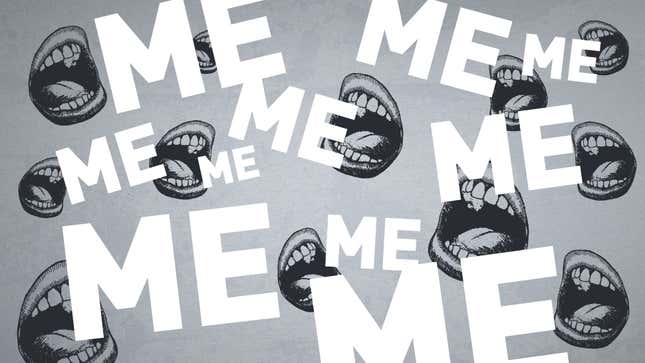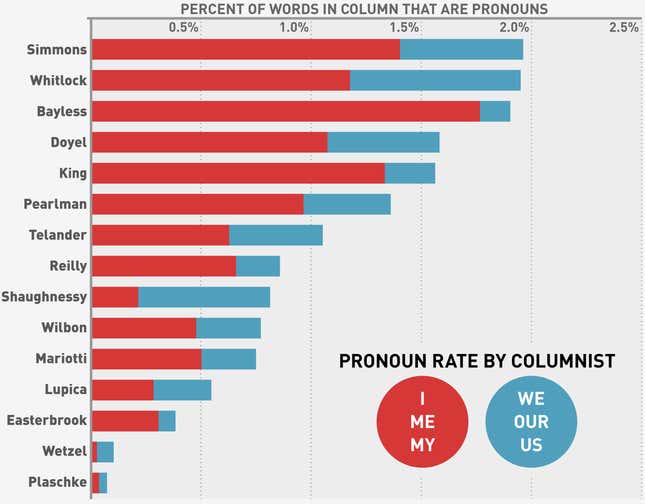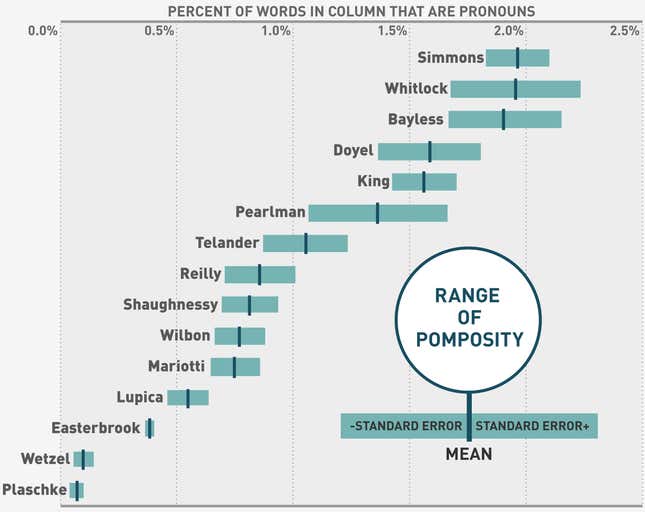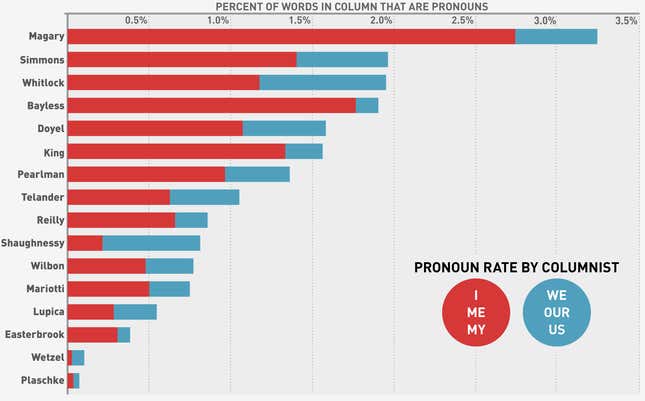
Of all the stupid rhetorical plays columnists use—issuing thundering imperatives, positioning their banal opinions as the exact midpoints between varieties of unyielding madness, championing their cronies' worthless businesses as examples of the disciplinary power of markets, etc. etc.—the funniest are always the ones that reveal they truly do regard themselves as small stars, able to fix planets in orbit around them through the gravitational pull of their self-regard.
Take this as an example, a 6,000 word column that tells you a little bit about Tracy McGrady, the stylish forward, and a lot about Bill Simmons, the well-known brand. It's all about what the greatest shot Simmons ever saw in person was; how much money he feels Robert De Niro and John Travolta owe him for making a bad flick; the fact that he texts with Kobe Bryant; and, mostly, his strong belief that he speaks for all basketball fans, the way Her Majesty the Queen speaks for the realms.
"We don't care," Simmons writes at one point of McGrady's unfortunate midcareer decline, "if this happens to the Juwan Howards and Richard Jeffersons of the world," and this is just one of the many opinions he confidently ascribes to you and to me:
we wish they could see what we're seeing ... we want to tell them. We always feel relieved ... We don't want to remember someone ... We don't want to remember him ... We want to remember ... We want to remember ... We want to remember ... We want to remember ... We want to remember ... we've spent the past seven years grading LeBron James on a curve ... we cannot allow ... we assumed ...
Do we know why Simmons—who is just a talking head from the television set, after all, and not an X-Men villain—thinks he can read our minds all the way from his California lair? Do we want to know, really? No, we don't. What we do want to know, to a point of scientific certainty, is whether Simmons—a man who recently wrote 16,000 words premised on the conceit that the the public is interested in his comparison of the NBA off-season to a Charles Grodin movie from 25 years ago—is really the most self-obsessed pundit of all, or just a fraudulent aspirant to the throne.
To find out, we selected 14 columnists whom we've accused of pomposity in the past—as well as the admirably modest Dan Wetzel, who served as a control—and analyzed how often they used personal pronouns in 25 of their most recent sports columns, excluding mailbags and interviews. (Wavelength monitors, spectrometers, and punch-card computers were involved.) Pronouns within quotes weren't counted unless the author was quoting himself, and we also counted when Greggg Easterbrook used "TMQ" or "your columnist" in the obvious place of a pronoun. ("TMQ's been on the record as saying ...") The chart below shows our topline results: the average pronoun usage for each writer, split by singulars and plurals.

(For Skip Bayless, all we had were the 16 columns he wrote for ESPN between last October and this June. He hasn't written anything more recently, and his most recent columns before these were from 2006. )
A caveat: Use of the first person might indicate many things that are not pomposity. We're not interested in such nuance, though—we're here to use pseudo-science to buttress our pre-existing distaste for certain columnists.
So, that said, what's there to see? Simmons clearly comes out on top among this group, even though his pronoun rate of 1.97 percent is statistically indistinguishable from those of Jason Whitlock and Skip Bayless. What separates him is volume: in our sample, his average column was 6,000 words long, so that he crushes the competition on sheer quantity of references to himself. (His columns routinely near triple digits in use of the word "I.") Qualitatively, too, he has as much claim to the crown as anyone; this is a man, after all, who watched a documentary about the Eagles—the atrocious band from 40 years ago, not the Philadelphia football team—and thought, "You know, I think the public would like to read 9,000 words from me about this."
Simmons, Whitlock, and Bayless are all multi-platform presences, probably more so than anyone else on the list save perhaps Michael Wilbon, and while we have no real opinion on how the causality arrow runs here, it seems unlikely that this is coincidence. TV encourages the kind of self-regard we're measuring here—a perception of oneself as a brand, and of one's work as an extension of one's personal brand. Of course, all three work for ESPN, and that's alarming: any place where they gather their egos together could become a black hole of solipsism powerful enough to tear apart the sun, and ESPN does occasionally get all its employees together for various reasons. (Be careful, Bristol.)
Why the low ranking of those lesser TV types like the Los Angeles Times's Bill Plaschke and the New York Daily News's Mike Lupica? (Lupica's not exactly short on self-regard, as you know; his ego is to journalism what Milton Berle's cock is to comedy.) We have a theory about this: For years, journalistic norms discouraged the use of the first person, even by columnists; immodesty of any kind was frowned upon. It stands to reason that longtime newspaper columnists who came up in a more self-effacing media age and who have not yet been totally assimilated by the TV Borg would sink to the bottom of the list.
Anyway. Coming in right below ESPN's power trio is Gregg Doyel, and that's fitting. As prize stud of the CBS Sports stable of troll columnists—unrivaled outside Bristol for depth and breadth of ability to deliver strong takes—he has duties and responsibilities, and no one has ever accused him of neglecting them. Consider this: Doyel is somewhat more self-referential than Sport Illustrated's Peter King, a man who dedicates a regular feature ("Ten Things I Think I Think") to the proposition that readers need to be familiar not only with his thoughts and various random things that have happened to him on Amtrak, but with his proto-thoughts, as well. That takes work, and Doyel puts it in. His columns on Manti Te'o ("We're whining in stories and on Twitter, and it's all over the place") and Alex Rodriguez ("I'm done with him") both rated in the top 10 most pronouny in our sample, a feat exceeded only by (of course) Whitlock.
One interesting finding that came up in the course of our research concerns collective pronouns: Dan Shaughnessy, the self-appointed tribune of all Boston fandom, managed to use "we," "our," and "us" more than anyone except Whitlock. (He in fact used "we" in all but one of the 25 columns we examined.) Skip Bayless, conversely, used "I," "me," and "my" more than a dozen times as often as he used his plurals. (Perhaps related: the Washington Post recently asked if he was the most hated man in sports.)
It should be said here that there's a big difference between a columnist who sprinkles pronouns consistently throughout every article, and one who saves them up to show just how passionate he is about Tim Tebow or Boise State's blue field. The chart below gives a sense of the range of pronoun usage for each columnist, showing the mean (pink) with standard error bars:

Whitlock and Jeff Pearlman had the widest ranges, alternating between articles chock full of pronouns ("Let's all learn from Cooper's gaffe" and "I hate, hate Super Bowl parties," respectively, both over 6 percent) and articles with almost none. Simmons, among those toward the top, had the narrowest range. His most pompous article—by both qualitative and quantitative measures—was the one in which he laid out the difference between "Sports Fan Me" and "ESPN Me," capping out at 4.4 percent pronouns, but his least pompous column was still 1.4 percent pronouns, higher than the average usage for 10 of these columnists. Greggg Easterbrook, meanwhile, cranks out TMQ like a robot, showing the least variation.
Our final and most important finding, though, doesn't have to do with any of these people. What happens when we include ourselves? We ran the numbers for the closest thing Deadspin has to a columnist, Thursday Afternoon NFL Dick Joke Jamboroo's Drew Magary. And... well...

So there you go: We're the most pompous pundits, according to our own pseudo-science. Whatever. We think we think this is bullshit.
Graphs by Reuben Fischer-Baum
Image by Jim Cooke, mouth drawing via Shutterstock